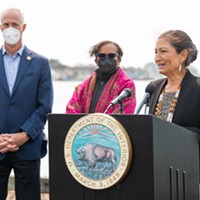[
{
"name": "Top Stories Video Pair",
"insertPoint": "7",
"component": "17087298",
"parentWrapperClass": "fdn-ads-inline-content-block",
"requiredCountToDisplay": "1"
}
]
Congressman Jared Huffman came to town this week, along with veteran news anchor Dan Rather and his crew, to get briefed on the unholy clusterfuck that is our rogue marijuana industry. It's an industry subsidized and metastasized thanks to the artificial price constraints resulting from the War on Drugs. On Tuesday morning, Sheriff Mike Downey told Huff and the media that the federal government needs to do one of two things: escalate the war or call it off.
According to Sheriff's Office spokesman Lt. Steve Knight, Downey outlined the expanding scope of collateral damage being caused by literally thousands of grow operations — the violence, the unpermitted grading and stream diversions and the widespread use of rodenticides and other poisons, which have begun to move up the food chain. (Remember that dead fisher found at a grow site last month? Murdered by a poisoned hotdog, the Sheriff's Office announced Monday.)
After the briefing, Huffman and Rather went for a helicopter ride to get an aerial view of some local grows. Later, they sat down in Huffman's Eureka office for one of those well-groomed, brightly lit TV newsmagazine interviews. Squeezed between those two events, our congressional representative took a few minutes to chat with the Journal about the day's events and the shifting sands of marijuana laws.
For his part, Huffman seems to be hedging his bets, arguing for national decriminalization while at the same time trying to get Humboldt County listed as High Intensity Drug Trafficking Area, which would serve to escalate the drug war here. "Incongruous?" Huffman asked, anticipating the response. "It only seems incongruous to folks who aren't familiar with what's going on on the ground."
He argued that given the current "incoherent and conflicting policy situation," his two-pronged attack is the only way to do it — working to reform the regulatory framework while continuing to address "the environmental damage, destruction and public safety issues" presented by big-time trafficking operations.
Even Downey has come to see eradication efforts as all but futile. At Tuesday's briefing he made a statement that would have been unthinkable for a man in his position just a few years ago. "I was never a big fan of legalization," the Lost Coast Outpost quoted him as saying, "but right now I think that's the most logical way to end this drug war."
Huffman predicted that things are moving in that direction. "I do think it is inevitable," he said. "I think marijuana prohibition will be a thing of the past, at least in states like California. ... But you can't wait for that."
Another point of agreement between Downey and Huffman is that the dead fisher is a big deal, a symbol that could serve as a wake-up call for increased eradication efforts on trespass grows. Wildlife biologists have long been aware of increased toxicology in wildlife due to poisons such as d-CON, Huffman said. "But this is a direct kill — and a fresh one, where they literally have pieces of the poisoned hot dog in the esophagus of the freshly killed animal."
Huffman said he's currently co-sponsoring "at least a half dozen" bills aimed at reforming marijuana policy, ranging from medical dispensary regulations to full federal decriminalization — and he has found some surprising allies in Tea Party Republicans who think recreational pot use should be none of the feds' business. Strange bedfellows, but Huffman said it's a good sign.
The big question mark that remains is the stance of the Obama administration. Despite assurances to the contrary, federal law enforcement officials have waged an unrelenting campaign against medical dispensaries, often targeting those trying hardest to abide by state laws. And nearly 10 months after voters in Washington and Colorado voted to legalize recreational use, the administration has yet to respond.
Huffman insisted that Obama's not burying his head in the sand: "I've been part of a very specific conversation with President Obama on this subject. What the president has said — and he's right — is that he inherited a law that Congress passed that made marijuana a criminal substance."
True enough. But what about Attorney General Eric Holder's assertion, way back in 2009, that the Justice Department would stop raiding state-law-abiding dispensaries? Huffman said the continuing raids are partly because federal prosecutors "have a lot of autonomy," but also because federal law is federal law. Pot is illegal. "And if Congress wanted to update that law and change it, my sense was [Obama] would be very happy to consider that."
Unlikely? Perhaps. But as Downey's call for legalization proves, today's unthinkable can quickly become tomorrow's reality. And there seem to be more signs every week that America is approaching some sort of tipping point on marijuana prohibition. We're at a stage where an authoritative voice from on high could make all the difference. Something like, say, Dan Rather in a helicopter.
Speaking of...
-

Huffman, Haaland to Visit Humboldt Bay Amid Growing Tribal Offshore Wind Opposition
Mar 26, 2024 -

Final Election Night Report Leaves Races Unchanged: Incumbents Lead Supes Contests, Van Dyke Ahead for Judgeship
Mar 5, 2024 -

Prominent Foster Parent Arrested in 'Lewd Acts' Investigation
May 24, 2023 - More »
more from the author
-
Last Days of the Surfing DA
Heading into his final year in office, Paul Gallegos talks politics, family and The Smiths
- Jan 2, 2014
-
Unequal Opportunities
Behind the ACLU's allegations of racial, sexual and disability discrimination in local schools
- Jan 2, 2014
-
Systematically Misled
- Dec 26, 2013
- More »


































